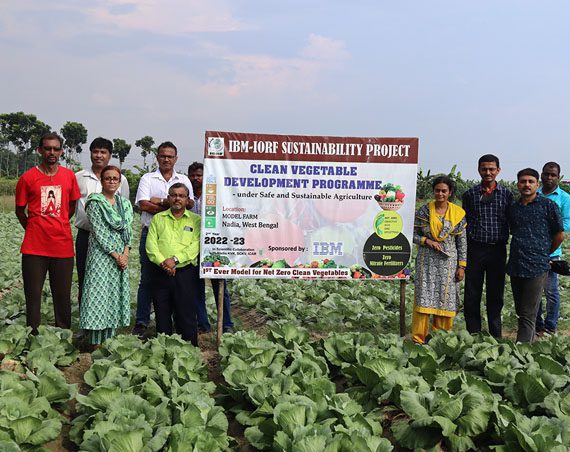
IBM-IORF Sustainability Accelerator Project (2021-22 To 2023-24)
During the Phase- II of the project Clean Food Net Zero (CFNZ) Model was developed which revolutionized the objectivity of Climate Positive Agriculture or reduction in GHG emission from agriculture. CFNZ is perhaps the first Agri-Net-Zero Model which has exhibited a huge negative Carbon Footprint of (-) 250.08 mtCO2e/ha. against (+) 1.47 mtCO2e/ha. of conventional agriculture. Also significantly CFNZ ensure the energy transition of 18,838 MJ/ha/yr i.e. a massive 57% shift from the present industrial agricultural system, when this sector is considered as impossible to be transformed.
CFNZ Model demonstrates all possible pathways against climate change mitigation adaptation, abetment and sequestration. Clean Food Net Zero (CFNZ) Model assures methane mitigation, the most crucial GHG for global warming and climate change apart from abatement of nitrous oxide another critical GHG with GWP value of 273. As agriculture will be the largest victim of climate change in spite of being the 2nd largest GHG emitter, CFNZ as Agri-Net-Zero Model is the highest form of sustainable agriculture, the model which is not only replicable and scalable; it is also affordable for the small holding farming community, seemingly impossible but hard fact.
- Total 39 milestones has been achieved in 3 years of project time period covering wide aspect of sustainable food production, livelihood sustenance and enhancement and climate change mitigation and adaptation.
- Nine sustainability tools have come out as the scientific offshoots of the IBM-IORF Sustainability.
- Total 10 research articles have already been published in different national/international journals and conference proceedings (perhaps the only of its kind for any sustainability project).
- The Clean Food Model under the IBM-IORF Sustainability Accelerator Project has received four recognitions, from various CSR evaluating organizations acknowledging its innovation, impact on food production, livelihood development, and climate change mitigation.
Finally one significant achievement of this project is the development of Agriculture Carbon Footprint Assessor (ACFA) Version 1.0, as the 1st India specific sustainable agriculture GHG emission tool. At the same time this version emphasizes the sustainability components in agriculture. While the CFNZ Model perfectly align with government initiatives towards Voluntary Carbon Market (VCM) projects. This transformative journey validated the feasibility of sustainable carbon efficient or carbon negative practice and collaboration in fostering a more sustainable future. The project showcased scalable models, cutting-edge technologies and thorough assessments, addressing climate change and promoting sustainable agriculture and impeding Seven SDGs 1, 2, 3, 11, 12, 13 and 15.

Inhana Organic Research Foundation (IORF) is a unique not-for-profit, scientific research based organization that is dedicated solely towards creating pathways that deliver truly tangible sustainability for the marginal and resource-poor farmers of our society.






Quick Links
Get In Touch
168, Jodhpur Park, 1st Floor, Kolkata – 700068














